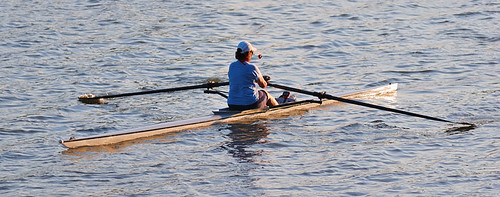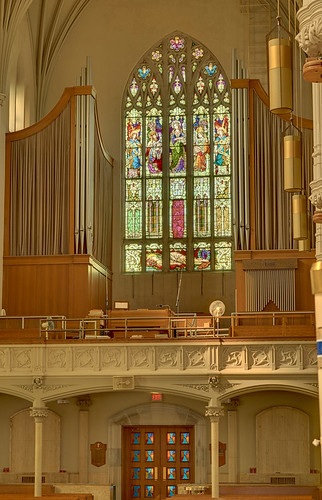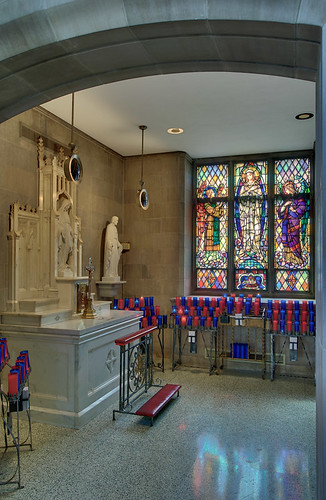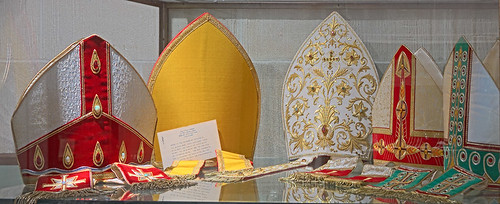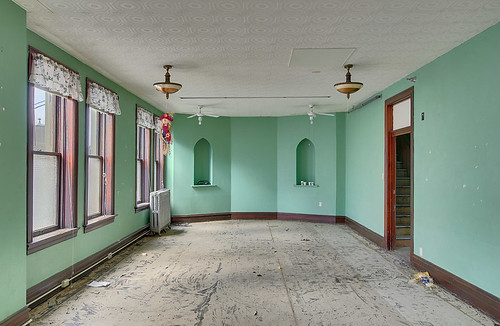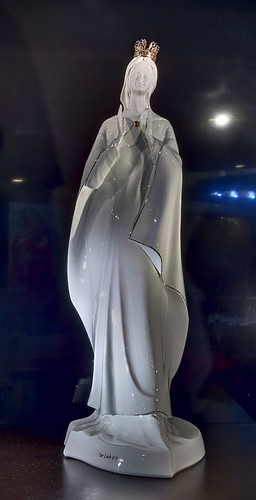OH MY! Masonic symbols in a Catholic church!
Click here to see a thread at Reddit. It discusses a possible Masonic/Catholic conspiracy, because of some symbolic art found in Catholic churches. Don't you love these discussions?
But the
Lodge got its symbols from the
Church, not the other way around.

The skull and crossbones, as seen in this photo at the
Shrine of Saint Joseph in downtown Saint Louis, Missouri, is an obvious symbol for death. The butterfly is an ancient symbol for the resurrection: the lowly caterpillar enters a burial shroud-like chrysalis, and is reborn as a glorious butterfly, which ascends to the heavens. One of the Greek words for butterfly is
psyche, which also is the Greek word for
soul, which reinforces this symbolism. The monogram☧is made of the Greek letters
chi, Χ and
rho, Ρ, which are the first two letters in Χριστός,
Christós, Christ. Therefore this is a symbol for the resurrection of Christ, and by implication, those who are united with Him.
While the Church's use of the skull and crossbones has a supernatural meaning, this same symbol is also quite natural, and can be either a warning — “now is the time for action, for tomorrow we may die”, and also as a sign for danger — or a threat, as seen in piracy.
The Eye of Providence symbol, a prominent element on the reverse of the Great Seal of the United States, is seen on the back of the one dollar bill. The symbolism on the Seal implies that Providence looks favorably on the creation of the Republic. Subsequently this became a patriotic symbol and was adopted by American Freemasonry, but it originally dates back to the age of Christendom.
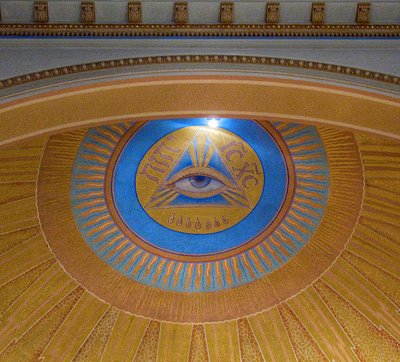
A similar symbol, seen at
Our Lady of Sorrows Church, in Saint Louis. In traditional iconography, God the Father is given a triangular halo, representing the Holy Trinity. Included in this symbol is the Hebrew tetragrammaton יהוה,
YHWH, the sacred and ineffable name of God; and the Greek abbreviation
Iesùs Christòs. Under the Eye are seven tears, possibly symbolizing the seven
dolors, or sorrows of Mary, although it may also be for the Seven Gifts of the Holy Spirit. This is an explicitly Trinitarian and Catholic symbol for God.
This is also the symbol for the first of the famous ‘
O Antiphons’ during the last week of Advent:
O Sapientia, ‘Oh Wisdom’. This symbol is occasionally used in church art along with the other O Antiphon symbols.

One commentator says this is an image of Christ between the two pillars of Masonry. The columns shown here look like mere decorative architectural elements in the Roman style, and certainly not like the unusual columns described in the Bible (
1 Kings 7) . Solomon's
Temple in Jerusalem had two copper-alloy columns placed on the porch: the left column named
Boaz, and the right
Jachin (it is thought that these were named after donors). These two columns are also used as symbols in Masonry —
but with their order reversed, symbolizing the exit from the Temple, and by implication, the Church.
There have always been heretics, evil-doers, and subversives in the Church, as Our Lord foretold in His
parable of the weeds growing up with the wheat, and so I ask my dear readers to pray for me, a sinner. Undoubtably there has been, and is today, wicked art in Catholic churches. But it is iconoclasm, the stripping of icons and art from the churches, which has been a considerably bigger problem.
But for a true conspiracy which infected the Church during the tumultuous years surrounding the Second Vatican Council, I suggest looking up the
Propaganda Due affair.










